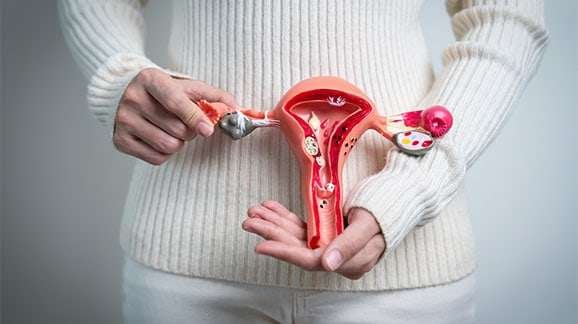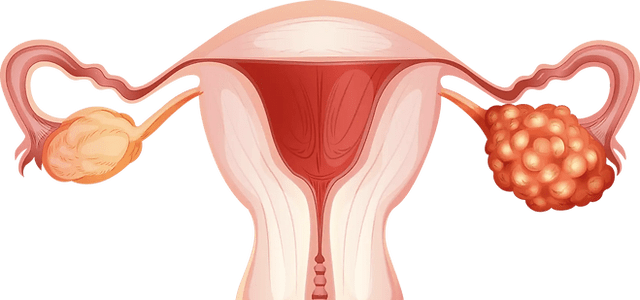
An ovarian cyst is a common condition that many women experience during their reproductive years. Often harmless and painless, ovarian cysts usually go away on their own — but in some cases, they can cause discomfort or complications if not treated properly.
Let’s understand what an ovarian cyst is, its causes, symptoms, and how Ayurveda explains and manages it naturally.
What is an Ovarian Cyst?
An ovarian cyst is a fluid-filled sac that forms inside or on the surface of an ovary. Women have two ovaries, one on each side of the uterus, which release eggs every month as part of the menstrual cycle. Many women will have an ovarian cyst at some point in their life, but most cysts are harmless and disappear without treatment.
Types of Ovarian Cysts
1️⃣ Functional Cysts:
These are the most common type and form as part of the normal menstrual cycle. They include:
- Follicular cyst: When a follicle doesn’t release an egg.
- Corpus luteum cyst: When fluid collects inside the follicle after the egg is released.
2️⃣ Pathological Cysts:
These are less common and include cysts due to abnormal cell growth, such as:
- Dermoid cysts
- Cystadenomas
- Endometriomas

What Causes Ovarian Cysts?
There are many factors that can lead to ovarian cysts:
- Hormonal imbalances
- Irregular menstrual cycles
- Severe pelvic infections
- Endometriosis
- Pregnancy (sometimes cysts form early in pregnancy)
Common Symptoms of Ovarian Cysts
Many ovarian cysts don’t cause any symptoms and are discovered during routine pelvic exams. However, larger or problematic cysts may show these signs:
- Pain in the lower abdomen or pelvis
- Bloating or swelling
- Pain during intercourse
- Irregular periods
- Frequent urge to urinate
- Difficulty emptying the bladder completely
- Sudden severe pain (if the cyst ruptures)
- Nausea or vomiting (in severe cases)
When Should You See a Doctor?
If you experience sudden severe pelvic pain, fever, dizziness, or rapid breathing, seek medical help immediately. A ruptured cyst or an ovarian torsion can be serious and may need urgent treatment.
Ayurvedic Perspective on Ovarian Cyst
In Ayurveda, an ovarian cyst is often linked to an imbalance of the doshas — especially Kapha and Vata. Poor digestion (Agni), accumulation of toxins (Ama), and hormonal imbalances are seen as the root causes. Ayurveda focuses on balancing hormones, improving digestion, cleansing the system, and supporting the body with herbs and lifestyle changes.
Always consult an experienced Ayurvedic practitioner before trying any treatment. Self-treatment is not advised.
How Ovarian Cysts are Diagnosed
Doctors may use:
- Pelvic exam
- Ultrasound scan
- Blood tests (to check hormone levels)
- Laparoscopy (in some cases)
Timely diagnosis can prevent complications and help you choose the right treatment approach.
Can Ovarian Cysts Be Prevented?
While you can’t always prevent ovarian cysts, a healthy lifestyle, regular check-ups, balanced diet, and stress management can reduce the risk. Ayurveda recommends keeping your digestion strong, avoiding excessive oily and processed foods, and following a balanced daily routine.
Don’t Ignore Ovarian Cyst Symptoms
Many ovarian cysts are harmless, but some may need medical care. If you feel unusual pain, irregular periods, or other signs, get checked early.
Need Ayurvedic Help for Ovarian Cyst?
If you’re struggling with an ovarian cyst or want to manage it naturally, talk to our trusted Ayurvedic experts.
👉 Visit Vedic Upchar’s Consultation Page to book your personalized Ayurvedic consultation today.